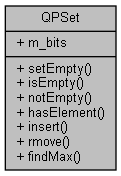Priority Set of up to 32 elements */. More...
#include <qpset.hpp>

Public Member Functions | |
| void | setEmpty (void) noexcept |
Makes the priority set me_ empty. More... | |
| bool | isEmpty (void) const noexcept |
| Evaluates to true if the priority set is empty. More... | |
| bool | notEmpty (void) const noexcept |
| Evaluates to true if the priority set is not empty. More... | |
| bool | hasElement (std::uint_fast8_t const n) const noexcept |
| the function evaluates to TRUE if the priority set has the element n. More... | |
| void | insert (std::uint_fast8_t const n) noexcept |
insert element n into the set, n = 1..QF_MAX_ACTIVE More... | |
| void | rmove (std::uint_fast8_t const n) noexcept |
remove element n from the set, n = 1..QF_MAX_ACTIVE More... | |
| std::uint_fast8_t | findMax (void) const noexcept |
Data Fields | |
| QPSetBits volatile | m_bits |
| bitmask with a bit for each element More... | |
Priority Set of up to 32 elements */.
The priority set represents the set of active objects that are ready to run and need to be considered by the scheduling algorithm. The set is capable of storing up to 32 priority levels. QP::QPSet is specifically declared as a POD (Plain Old Data) for ease of initialization and interfacing with plain "C" code.
|
inlinenoexcept |
|
inlinenoexcept |
|
inlinenoexcept |
|
inlinenoexcept |
|
inlinenoexcept |
|
inlinenoexcept |
|
inlinenoexcept |
| QPSetBits volatile m_bits |